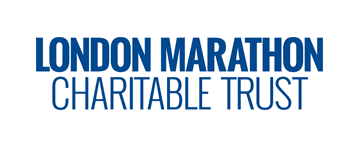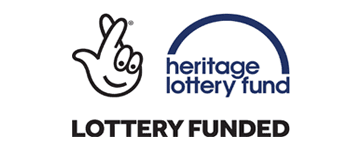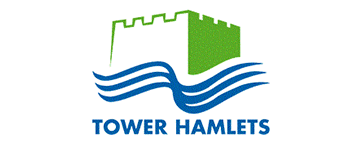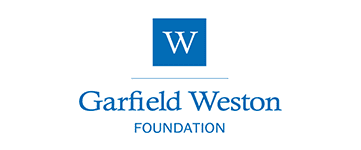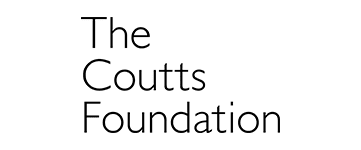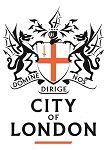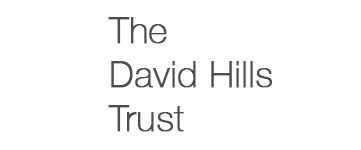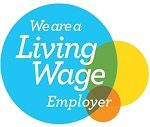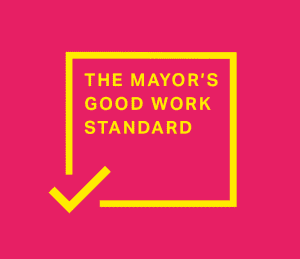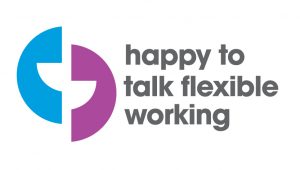Our response to the disproportionate impact of COVID-19 on BAME communities
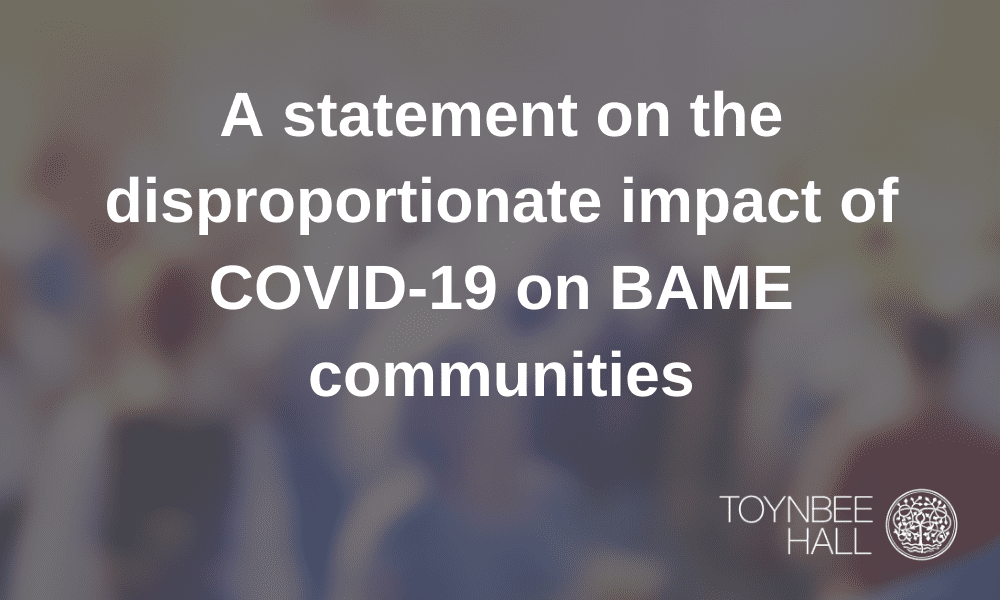
Our reaction to Public Health England’s findings which show the COVID-19 death rate is higher for people of black and minority ethnicities and in areas of high deprivation.
The staff and trustee team at Toynbee Hall have read and discussed with deep concern the report from Public Health England published on 2 June 2020 on the disproportionate impact of COVID-19 on people from black, Asian and other ethnic minority backgrounds. We stand together with the communities around us who feel such anger and pain at the experience and witnessing of racial injustice. Equality, justice and fairness are at the heart of all we do and believe in. We are in solidarity and add our voices to the urgent calls for change. We have collectively written the following statement setting out our reaction and calling for proactive action from ourselves, Government and others to address the persistent structural inequality arising from institutionalised discrimination based on race and class within the UK.
Throughout the Covid-19 crisis there has been growing evidence that some communities have been harder hit than others by the virus.
On 2 June Public Heath England published data confirming that the death rates from Covid-19 have been significantly higher among people of black and Asian origin than for any other ethnic groups in England.
The report shows that people of black backgrounds are the ethnic group most likely to be diagnosed with the virus, and people of Bangladeshi ethnicity have twice the risk of mortality as their white British counterparts.
The Office of National Statistics (ONS) also found a direct link between the level of deprivation in an area and mortality from COVID-19. The communities we serve alongside, in Tower Hamlets and neighbouring boroughs, Hackney and Newham, have the highest age-standardised mortality rates in England[1].
It is now clear that higher levels of deprivation are compounding the virus’ death toll, with Londoners in low income areas – like many of the communities around Toynbee Hall – the most exposed and vulnerable. Inequality has demonstrably worsened the impact of the pandemic in these boroughs; in London, people of black, Asian and other minority ethnicities are likely to be over represented in all of the workforces that are at risk, in supermarkets, the transport sector and those who are now returning to work because their jobs cannot be done at home and so are at greater risk from increased exposure on transport and in the work place. But the pandemic has also increased short-term inequality; lockdown has placed greater strain on people living in overcrowded housing with limited access to green space, low levels of digital and financial inclusion, and little disposable income to meet the extraordinary additional needs of lockdown in the form of extra food, energy and data use.
We are therefore disturbed by the lack of clarity around the disparity in the impact of Covid-19 upon different communities, the reporting[2] that the Government removed key sections detailing the lived experience and perspectives of people from BAME backgrounds, and the Government’s ongoing inaction in addressing this.
It is our firm belief that Covid-19 has hit these communities hardest as a direct result of the long-term structural inequality arising from institutionalised discrimination based on race and social class in the UK, as demonstrated by the fact that:
People have insufficient income to meet their basic needs, either because state benefits are set too low for real living costs, because too many employers pay below the real London Living Wage, or because the hostile environment inhumanely denies some people access to benefits, and the right to work. This undeniably impacts more on people from many minority communities.
Families on low incomes have no option but to live in overcrowded housing, often with multiple generations living in one household. This significantly reduces their ability to self-isolate if they develop symptoms, and so makes it harder to protect other family members, including older and other more vulnerable family members.
Living on a very low income in built-up areas with limited access to green space and higher pollution levels[3] is linked directly to a higher incidence of those underlying medical conditions which in turn exacerbate the impact of COVID-19; diabetes, asthma, heart conditions and a high BMI are all additional risk factors of COVID-19.
The types of low paid work in which BAME workers are over–represented compared to the general population are also those types of work which cannot be done from home, which bring the worker more often into direct contact with a high number of people, and which have a higher risk of exposure to COVID-19. These include frontline roles in health and social care, shop floor roles in supermarkets and other food shops, and on public transport.
People affected by these systemic issues of racial inequality have fewer resources to cope with the impact of the COVID-19 virus itself, or the restrictions created by lockdown. So they are more likely to have to travel by public transport to go to work or seek medical help, less likely to have digital connectivity at all, let alone at an affordable price, and less likely to be within walking distance of affordable and healthy food and a safe place to exercise.
Last week Mayor of London Sadiq Khan called for a public inquiry into the disproportionate impact of the crisis, to expose the deep inequalities our society and economy are built upon, and to provide an opportunity to forge a new contract on race and social inequality. As a community organisation whose mission is to work in partnership with the people of East London to shape a fairer and happier future, we strongly support the Mayor’s call, and members of our team have contributed to evidence gathering sessions hosted by the GLA about the disproportionate impact.
To go further to tackle these unacceptable levels of health, social and racial inequalities, we fully support the recommendations proposed by the Coalition of Race Equality Organisations. Toynbee Hall also strongly urges that:
The Government should commission further research as a priority into the reasons why more people from BAME backgrounds are affected more seriously, in order to confirm causation, not just correlation, and make public the evidence to enable us all to take positive action as organisations and call others to do the same.
All entities, including charities like Toynbee Hall, but also government, business, and the third sector, should publicly recognise and do the work required to eliminate all structural racism which perpetuates the socio-economic inequality faced by people from BAME backgrounds and which is a key driver in all health inequalities, including COVID-19.
Government and all those with power to create change must directly engage with people from BAME backgrounds, and the organisations which authentically represent their needs, as equal partners in creating solutions to give them better protection now, and build greater health outcomes for all in the longer term.
We include a responsibility upon Toynbee Hall to be part of this work to dismantle systemic racism and social inequality. While over the years, many people from different communities have led transformative social change from within our organisation, their contributions have at times been overlooked, and we know that we have also benefitted significantly from a society in which whiteness and wealth dominate.
We wanted to add our voice to the calls for change sooner but felt it was vital that we convey the views of our staff and board of trustees in any communication, which we have been gathering over the past week. We wanted anything we say to be meaningful, proposing real and specific calls to action for ourselves and our partners based the experiences of people in our community.
We have begun work on our governance, which has historically been overwhelmingly white and often drawn from outside of our local area. Through proactive recruitment, we now have a much more diverse board of trustees, more strongly rooted in Tower Hamlets and its BAME communities. However, we recognise we still have much to do in becoming a truly diverse organisation in our leadership and beyond. The events this week have sharpened our focus on the need to accelerate this work and we are committed to doing better, sooner. Transparency is essential to open discussion and taking action, so we are committed to publishing equalities data for the organisation including in relation to reward by 31 August 2020. We will share our progress and challenges openly, and welcome input from the local community and others on how we can be a better ally in this work and truly embody the change we wish to help achieve in the world.
It is not enough to know that structural racism and inequality are the cause of higher infection and death rates from COVID-19 among the BAME communities. As a society, it is our collective duty to take swift and effective action now to protect those most at risk from harm. We must all provide the space and resources people from BAME backgrounds need to be safe now, including effective PPE for all frontline workers, continued economic support at levels which guarantee essential needs are met, full access to benefits regardless of immigration status, including Statutory Sick Pay, and increased public transport to avoid overcrowding. And we must work in partnership with those most affected to build solutions which eliminate these systemic injustices. We are learning and acting too late to save those lives already lost. We owe it to them to make the lasting legacy of COVID-19 the rebuilding of our economic and social structures so that ethnicity is no longer a reliable predictor of who will be most affected in the next pandemic.
[1] https://www.centreforlondon.org/wp-content/uploads/2020/05/The-London-Intelligence_May-2020.pdf
[2] https://www.hsj.co.uk/story.aspx?storyCode=7027761.
[3] https://www.theguardian.com/environment/2019/feb/04/europes-most-deprived-areas-hit-hardest-by-air-pollution




